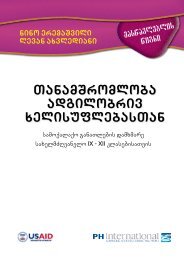The Geneva Protocol, by David Hunter Miller
The Geneva Protocol, by David Hunter Miller
The Geneva Protocol, by David Hunter Miller
Create successful ePaper yourself
Turn your PDF publications into a flip-book with our unique Google optimized e-Paper software.
CHAPTER XII. 51<br />
Now what Article 11 of the <strong>Protocol</strong> does in its first paragraph is to say that the obligations of all States in<br />
regard to the sanctions mentioned in paragraphs 1 and 2 of Article 16 of the Covenant will, when the call for<br />
the application of the sanctions is made <strong>by</strong> the Council, immediately become operative, in order that such<br />
sanctions may forthwith be employed against the aggressor.<br />
So far as the first paragraph of Article 16 of the Covenant is concerned--the economic and financial<br />
blockade--I do not see that this first paragraph of Article 11 of the <strong>Protocol</strong> adds anything to that first<br />
paragraph of Article 16 of the Covenant, even when the former is read in connection with the second<br />
paragraph of Article 11 of the <strong>Protocol</strong>.<br />
It is true that in the resolutions about the economic weapon in the Assembly of 1921, it was recognized that<br />
from practical points of view the application of the economic pressure cannot be made equally <strong>by</strong> all<br />
countries. But undoubtedly, subject to the practical difficulties mentioned, a definite obligation exists in<br />
Article 16 of the Covenant to impose economic sanctions against the aggressor, and, as I said, in my judgment<br />
this obligation is not changed <strong>by</strong> the <strong>Protocol</strong>; but it can now become an operative obligation only if and when<br />
the Council says so.<br />
<strong>The</strong> vital question regarding sanctions under the <strong>Protocol</strong> arises under the second paragraph of Article 16 of<br />
the Covenant in connection with the first and second paragraphs of Article 11 of the <strong>Protocol</strong>. Indeed, it is<br />
because of this second paragraph of Article 11 of the <strong>Protocol</strong> that the question regarding the use of the<br />
British Fleet has been raised in England.<br />
Article 16, paragraph 2 of the Covenant reads as follows:<br />
"It shall be the duty of the Council in such case to recommend to the several Governments concerned what<br />
effective naval, military or air force the Members of the League shall severally {77} contribute to the armed<br />
forces to be used to protect the covenants of the League."<br />
Article 11, paragraphs 1 and 2 of the <strong>Protocol</strong> read as follows:<br />
"As soon as the Council has called upon the signatory States to apply sanctions, as provided in the last<br />
paragraph of Article 10 of the present <strong>Protocol</strong>, the obligations of the said States, in regard to the sanctions of<br />
all kinds mentioned in paragraphs 1 and 2 of Article 16 of the Covenant, will immediately become operative<br />
in order that such sanctions may forthwith be employed against the aggressor.<br />
"Those obligations shall be interpreted as obliging each of the signatory States to co-operate loyally and<br />
effectively in support of the Covenant of the League of Nations, and in resistance to any act of aggression, in<br />
the degree which its geographical position and its particular situation as regards armaments allow."<br />
On its face, paragraph 2 of Article 11 of the <strong>Protocol</strong> merely interprets paragraph 2 of Article 16 of the<br />
Covenant; but unquestionably it greatly changes it. Under the provisions mentioned of the Covenant, the<br />
Council had merely the duty of recommendation as to forces to be contributed <strong>by</strong> Members of the League.<br />
Undoubtedly under Article 16 of the Covenant, paragraph 1, any Member of the League had the right, if it<br />
chose, to consider itself at war with an aggressor, but equally under that paragraph any Member of the League<br />
had the right, if it chose, not to consider itself at war with an aggressor. Consequently there was no duty<br />
whatever under that Article 16, not even a moral duty, in my judgment, on the part of any Member of the<br />
League to contribute any armed forces whatever. <strong>The</strong> Council had the duty (under Article 16, Paragraph 2, of<br />
the Covenant) of making a recommendation; but it was merely a recommendation, and there was no<br />
obligation of the Member of the League to which the recommendation applied; there was merely a possible<br />
privilege to the Member of the League to which the recommendation applied--and that is a very different<br />
thing.
















